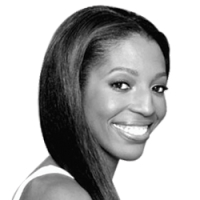After the Duchess of Sussex and her husband, Prince Harry, announced they would be stepping back from their roles as senior royals, my mom had this to say: “I’m proud of her.”
The “her” was Meghan Markle, whose chilly reception by the British press seems to have played a role in the couple’s decision. As our conversation continued, it became clear that my mother’s words were not simply rooted in the idea that she (like a lot of women of color) sees this move as the duchess’s way of standing up for herself in the face of an inherently classist and occasionally racist and anti-American press.
She was even more impressed to see Markle take a stand as a modern feminist stifled by an institution that has ended up proving in its treatment of her just how increasingly irrelevant it is.
Since Prince Harry’s courtship of Markle began, one narrative has defined most coverage of their union: It’s Cinderella come true; a real-life fairy tale. How lucky that a woman from a humble background—a racial minority to boot!—could snag one of the world’s most eligible bachelors from one of the world’s most powerful families, and get to live every little girl’s dream by literally becoming a princess, with a fabulous wardrobe, a lot of smiling and waving, and your very own collection of tiaras.
The only thing missing from this narrative is the fact that it’s actually not the dream of most little girls and educated women today.
In America at least, more women are earning college degrees than men and also outnumber men in law school. Sure, it’s plausible that some of these women secretly just want to fill their time shopping, socializing, and wearing tiaras. But it’s clearly more plausible that women are finally getting to fulfill the academic and professional potential our mothers and grandmothers never could.
That means that the idea of permanently giving up a career you’ve worked hard to build and are passionate about to fulfill a more traditional image of womanhood isn’t actually a fairy tale for plenty of modern women but a nightmare.
I couldn’t help feeling empathy for the Countess of Wessex, Prince Harry’s aunt, upon learning that she was forced to give up her impressive career as a public relations executive because of the conflict it created with her role as a member of the royal family.
I believe the fact that Meghan Markle may have given up her acting career, but declined to give up being Meghan Markle, activist, feminist and her own woman, is the real reason she made so many fans of the royal family uncomfortable from the very beginning.
It’s similar to the chilly reception Hillary Clinton received as first lady. Sure, she was rough around the edges, in comparison to some of her more polished predecessors, but the real reason Hillary was despised by some from Day 1 was that she was a first lady who felt White House bake sales or safe, “lady”-like “issues” were a waste of her position when she could be pushing health care reform.
So in the same way that Hillary Clinton was a threat simply because she wasn’t a Barbara Bush and didn’t aspire to be, Meghan Markle was similarly despised because she wasn’t a Kate Middleton—and didn’t aspire to be. Of course that’s why women like me admire and like her, and why so many others never will.
It’s worth noting that despite some of the classism she battled in the early days, Kate Middleton fits fairly seamlessly into the royal family because she doesn’t actually embody any of the feminist hallmarks that make traditionalists uncomfortable. She never pursued a real career, instead doing what many women raised by class-conscious parents do, which is focus instead on finding a high-powered mate and then devoting most of her time and energy to keeping him and his high-powered family happy.
And therein lies Meghan Markle’s biggest sin.
Here is a woman from an even more humble background than Kate Middleton’s, who is clearly not concerned with keeping her husband’s fancy family happy. She’s focused on her, her husband’s and their child’s happiness.
For those who would kill to rub elbows with royalty and to land a husband in the 1 percent (or let’s be honest, the .0001 percent), the idea that Meghan Markle doesn’t see being a member of the royal family as the ultimate brass ring worth keeping is like giving the middle finger to every aspiring socialite out there.
There are more than a few of them working in media, and if Markle’s ease at ascending the ultimate ladder of power had already fueled envy (and bullying press coverage), walking away from it all is likely to leave those who know they will never be in the same room with a prince, let alone marry one, downright apoplectic.
Nothing unnerves someone trying to keep you out of a place more than you telling him you have no interest in being there, and don’t understand why anyone else would either. By stepping back from being a senior royal, that’s just what Markle has done. She penetrated the royal walls, looked around, and decided: Eh, I can do better.
A half-black, American divorcee from a humble background is not supposed to tell the Queen of England she believes she can create a better life for herself and her son, without her, her family, or their pomp and circumstance. And yet that’s just what Markle did.
My mother describes Meghan as just the type of role model girls need in a world in which they are inundated with images of female celebrities either twerking, trying to land a man on reality TV, or flossing their bling on Instagram.
Instead, Meghan Markle is showing little girls how a modern Cinderella rolls. When the prince shows up with the glass slipper, this princess says, “We don’t actually need a palace, and I can buy my own shoes.”






